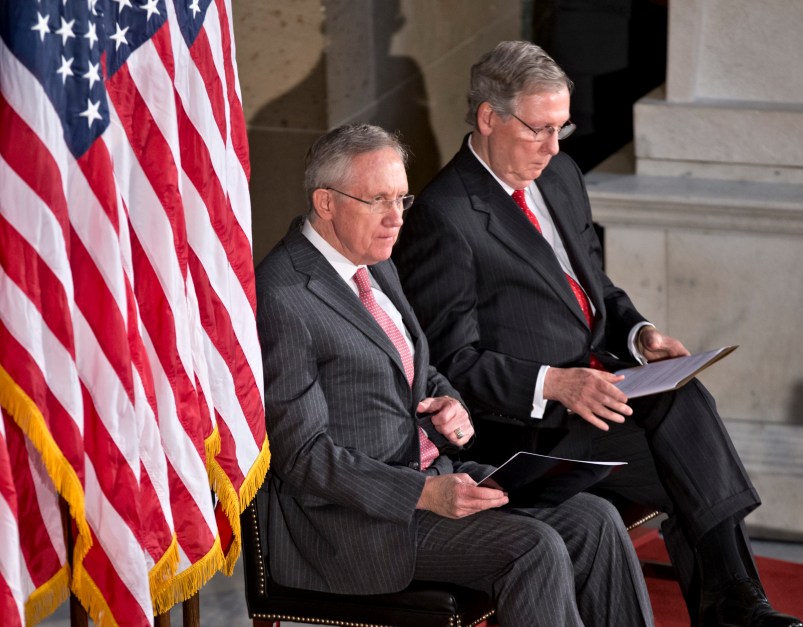Just days away from a potential default on the federal government’s financial obligations, a deal to lift the debt ceiling ahead of the Thursday deadline and reopen the shuttered government remained out of reach Monday.
House GOP leaders are on the sidelines as the focus for negotiations has turned to the Senate, where Republicans are fed up with their conservative House colleagues but have not yet reached a consensus deal with Democrats. But while the Senate has taken its place in the spotlight for the moment, there remains no guarantee that any deal emerging from the upper chamber will be able to win the backing of Republicans in the House.
After rejecting various proposals from the House GOP and from Sen. Susan Collins (R-ME) in recent days, Senate Majority Leader Harry Reid (D-NV) began talks on Saturday with Minority Leader Mitch McConnell (R-KY). They haven’t come to an agreement yet as the two remain at odds over spending levels and are having a hard time reconciling incompatible demands.
“I have had a productive conversation with the Republican leader this afternoon,” Reid said late Sunday afternoon on the Senate floor. “Our discussions were substantive and we’ll continue those discussions. I’m optimistic about the prospects for a positive conclusion to the issues before this country.”
How the impasse might be resolved remains a mystery. Democrats have publicly refused to offer substantive concessions merely to reopen the government or avert default, wary of encouraging Republicans to use the threat of crisis to extract ransom. Republicans have all but abandoned their lofty demands to defund or dismantle Obamacare and are insisting on locking in sequestration spending levels beyond this year, which Democrats are resisting.
One emerging framework is a short-term continuing resolution and debt limit hike tied to establishing formal negotiations for a longer-term budget agreement. For this to be politically feasible, the mechanism for the negotiations would have to be strong enough for Republicans to say they’re getting something out of it, but open-ended enough for Democrats to say they’re not being backed into a corner.
“I think we’re 70-80% there, putting the extra 20-25% to it,” Sen. Joe Manchin (D-WV) said Monday on CNN’s “New Day.” “When should the (continuing resolution) come due, when should the debt ceiling come due, and does that give that time for the budget conference, the budget committees to sit down and work through this? Those are the details that have to be worked out.”
Among Republican senators, the mood is close to despondent as the party takes a brutal beating in the polls amidst the government shutdown.
“The mood is pretty tough,” said a Senate GOP aide, who requested anonymity to speak candidly. “It’s the lack of strategy towards a specific outcome that is most disheartening. Outside a few borderline delusional folks, no one believes there’s a viable strategy to stop Obamacare. So what exactly are we fighting to achieve? The government will re-open and the debt limit will be extended. These are facts. What will we get, if anything? That’s the tough part.”
Democrats believe they have the upper hand. But after Republicans unanimously filibustered a debt limit hike with no policy add-ons Saturday, Reid saw little choice but to enter into negotiations, which he had vowed not to do. It’s unclear, though, what if anything he would be willing to give up — and if it’d be acceptable to the Republicans.
Sunday afternoon, McConnell publicly endorsed the Collins proposal, which Reid rejected on Saturday. It would enshrine sequestration spending levels into 2014, extend the debt limit for several months and delay Obamacare’s medical device tax. Democrats are willing to swallow the $986.3 billion sequester-level spending cap through 2013 but not into next year, wary of ceding leverage when it comes time to replace the automatic cuts. They also view the plan as unfair and balk at the idea of making policy concessions to avert needless crises.
“We’ve said all along we want negotiations and we want a budget agreement, but only after Republicans reopen the government and take the threat of default off the table. We won’t negotiate in a hostage situation,” said a senior Democratic aide. “But if there are triggers or conditions, that also becomes problematic.”
President Barack Obama is deferring to Reid in the latest round of negotiations, but the White House is said to be getting regular status updates. Six Democratic senators — Heidi Heitkamp (D-ND), Mark Pryor (D-AR), Amy Klobuchar (D-MN), Angus King (I-ME), Joe Donnelly (D-IN), and Manchin — announced Sunday afternoon they were also negotiating with Collins on a possible resolution. “There are negotiations,” they said, “but there is no agreement.”
Meanwhile, conservatives — led by Sen. Ted Cruz (R-TX) and former Alaska Gov. Sarah Palin — rallied Sunday on the National Mall, some waving a Confederate flag, demanding the GOP stand firm. House Republicans are worried their Senate counterparts will strike a deal that’s unacceptable to the conservative base, which has been implacable throughout the standoff.
On the House side, Rep. Paul Ryan (R-WI), the Budget Committee chairman, has proposed to lift the debt ceiling for six weeks while replacing sequestration with cuts to retirement benefits. The White House and Democrats have rejected that approach.
“Paul Ryan’s going around saying he’s mad at Senate Republicans because they’re about to jam them over in the House. Well, no shit. Welcome to reality,” said a former top Democratic aide with close ties to leadership. “House Republicans have made themselves irrelevant.”
It’s unlikely that any bipartisan deal in the Senate will be embraced by the staunch conservatives who call the shots in the House. That means Speaker John Boehner (R-OH) may yet end up having to violate the so-called Hastert Rule and bring it to a vote without the support of his conference, a move he has desperately sought to avoid throughout this standoff for fear of a conservative revolt that could cost him his speakership.






